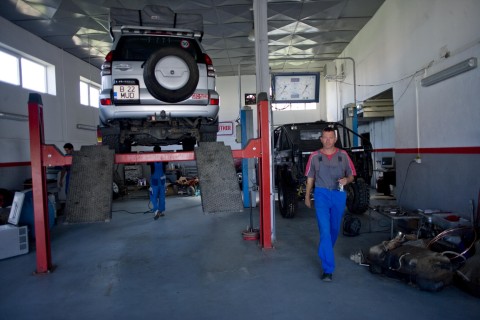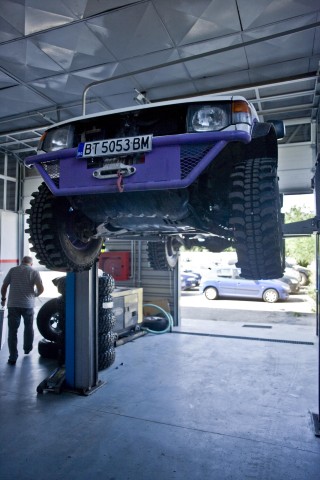Off road cars have a particularly tough life which is usually pretty hard to predict. The people that build a Land Cruiser 70 cannot predict whether the lovely Japanese creation will end up serving as a family car or be transformed into an extreme tray back competition vehicle. So they think of everything. As do the British who manufacture the Land Rovers which, just like the Land Cruisers, often range in utility from farming vehicles to family cars to winch challenge trucks. Every bit of the car, one way or another gets abused. The steering box and the transmission from a 4x4 will take a level of abuse far greater than the one sustained by its equivalent from a regular car.

But, whether its a regular car or a 4x4, all cars need to pass the a periodical inspection (known as an MOT in the UK for instance, an ITP in Romania and main inspection in Iceland different countries attribute different names for the same periodical testing system) or an equivalent periodical testing system.
These check-ups are aimed at observing the cars individual components and the way they function. The specialized police-approved car repair shops check everything from front to back, with regards to the components factory parameters. This system was implemented in order to control the vehicles that are approved for driving on the road, being concerned with the safety of the driver, passengers as well as other traffic participants and pedestrians (a little while ago there began a campaign to ban the mounting of large front bumpers, arguing for the safety of other cars as well as pedestrians, in the event of an accident)

The issue at hand concerns the modifications that a 4x4 car undergoes, which separates it from the state in which it was driven out of the factory parking lot. If the owner wants to install extra lights, a winch, an external or internal roll cage, these need to be road legal. An easy way to do so is to discuss with the authorities that release the road-legal-certification and present the plans, sketches or images of the unit you would like to install. Any of the MOT approved car repair shops should be able to help you out with this. Its a little bit of a headache, running around and getting your modifications approved but it will save you fines or even confiscation of the car, in the long run. Ive heard stories about people who underwent MOT testing and they were asked to, and I quote, restore the vehicle to its factory specifications when you have to take out a set of lights, thats fine. But when youve cut into the truck, lifted it and so on, this action becomes a little bit more difficult.
The periodical testing deals with the functionality of the systems and subsystems of the car and here is where a 4x4 owner will have to keep an eye out for problems. From personal experiences as well as stories from our offroad club, I observed that trucks fail on some sections that keep repeating. One of them, as I pointed out before, would be the steering box. Every shock from every rock and every ditch is transferred from the wheels directly into the steering rod, steering box and steering damper. Their importance in the whole driving process is fairly obvious as is probably the manufacturers plan to build lasting components. But an off road cars steering box will almost never function at its best if its used off road.
The seals, the coils and all the other moving parts inside will withstand a level of damage that can vary and thus the components need to be checked more often. A leaky steering box is the first sign of trouble. Vibrations in the steering wheel also point towards problems, just as a slow reaction or having the steering wheel move without the wheels (there should a 15 degree allowance, in which the steering wheel is allowed to move freely. Replacement of bushes and various smaller items can improve your chances of passing the MOT without complications. Anything over that is a problem and can constitute a reason for a check-up failure).
The thing to remember is that the testing is mandatory and must be done every 2-3 years, depending on the country your car is registered in. Without a valid periodical check-up stamp, youre prone to get a fine or get the car or papers confiscated. This is just some little thing to have in mind when you start thinking about modifying your truck for racing or pleasure.